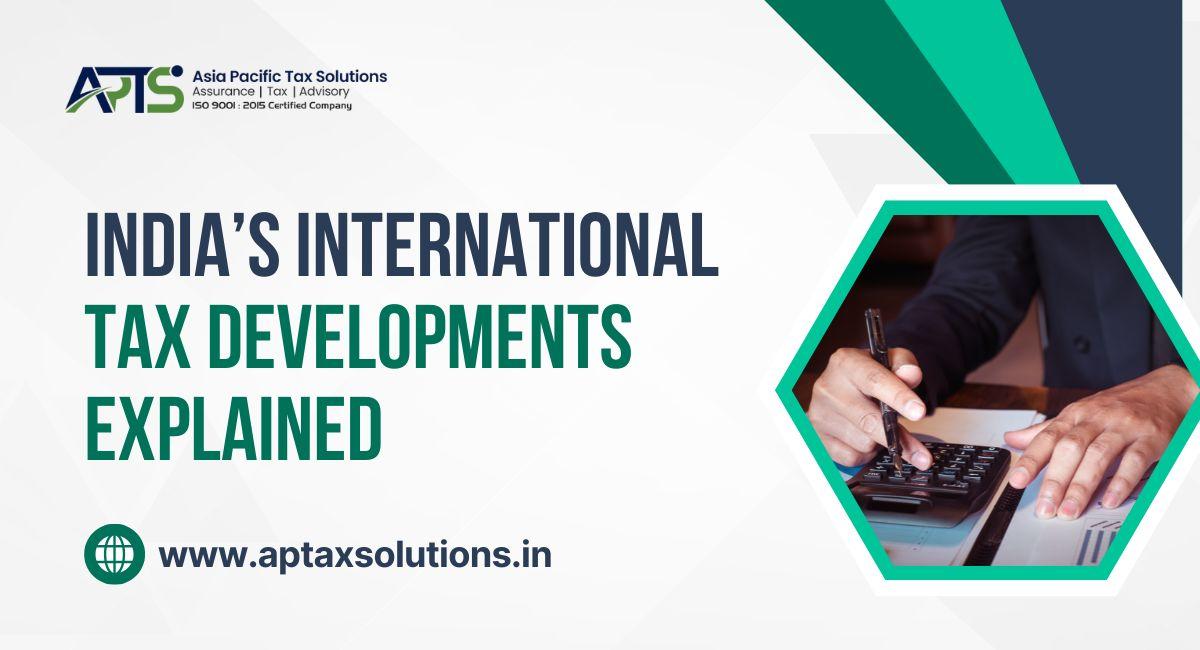India’s International Tax Developments Explained
India is a key player in the global economy, and as trade, technology, and cross-border investments grow, so do the complexities of taxation. Understanding India’s international tax developments is essential for companies, investors, and professionals who interact with global markets. While the subject may seem technical, the changes are aimed at making India a more transparent and business-friendly destination.
This article unpacks the major developments in India’s international taxation space, their significance, and how professional support like international direct taxation services in India helps businesses navigate these shifts.

Why International Taxation Matters
International taxation deals with how income and transactions across borders are treated by different countries. With India being one of the world’s fastest-growing economies, its tax rules influence:
- Multinational companies operating in India
- Foreign investors exploring Indian markets
- Indian businesses expanding abroad
Fair and consistent taxation ensures that global trade thrives while minimizing double taxation or tax evasion.
Key International Tax Developments in India
India has been modernizing its tax framework in line with global practices. Some noteworthy areas include:
Transfer Pricing Regulations
Transfer pricing refers to how multinational companies price transactions between their entities in different countries. India has been strengthening its regulations to ensure fairness, so profits are not unfairly shifted outside the country.
Double Taxation Avoidance Agreements (DTAAs)
To prevent businesses from being taxed twice—once in India and again in another country—India has signed multiple tax treaties. These agreements promote smoother cross-border investment and trade.
Adoption of OECD Guidelines
India has aligned with several recommendations from the Organisation for Economic Co-operation and Development (OECD), especially in tackling base erosion and profit shifting (BEPS). This makes the system more transparent and globally relevant.
Digital Taxation Measures
As the digital economy grows, India has introduced frameworks to ensure fair taxation of online services and e-commerce transactions, even when providers are based outside the country.
Global Minimum Tax Discussions
India has also been actively engaged in global conversations about minimum corporate tax rates. This ensures large multinational corporations contribute fairly, regardless of where they are headquartered.
The Impact on Businesses
These international tax developments create a more predictable and transparent environment, but they also bring challenges:
Complex Compliance Requirements: Companies must keep track of multiple rules and treaties.
Documentation Needs: Transfer pricing and cross-border dealings often require extensive records.
Adaptability: Businesses need to stay updated as tax laws continue to evolve.
This is where professional guidance becomes invaluable.
Role of Professional Support
For organizations working across borders, managing taxes can feel overwhelming. Firms providing International Direct Taxation services in India bridge this gap by offering:
- Guidance on structuring international transactions
- Support in applying double taxation treaties effectively
- Assistance with transfer pricing documentation
- Insights into ongoing global tax reforms
With such expertise, businesses can focus on growth while ensuring they meet all international tax obligations smoothly.
Benefits of Staying Updated
Understanding international tax developments in India offers several advantages:
Global Competitiveness: Businesses align with international standards.
Reduced Risk: Fewer chances of penalties or disputes.
Efficiency: Better planning of cross-border operations.
Opportunities: Access to incentives or favorable treaty benefits.
Looking Ahead
India’s international tax environment will continue to evolve in response to global economic shifts and digital advancements. Businesses that remain proactive, supported by experienced advisors, will find the changes less daunting and more opportunity-driven.
Final Thoughts
India’s international tax developments reflect its growing role in global trade and investment. While the changes can seem complex, they ultimately create a clearer, fairer system for businesses and investors.
